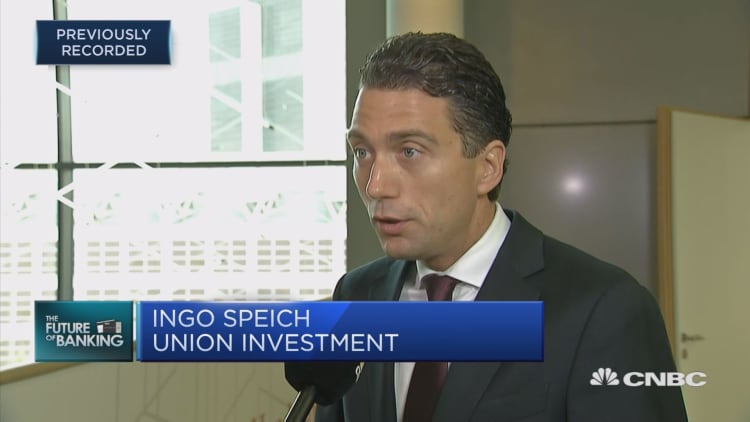
A tie-up between Germany's two biggest banks could be on the cards sooner rather than later, according to a report from the Financial Times.
Deutsche Bank and domestic rival Commerzbank have been at the center of merger speculation for years, but the Financial Times reported Tuesday that many external observers based in Frankfurt now believe a proposed deal simply comes down to a question of when — and not if.
To be sure, with almost 2 trillion euros ($2.2 trillion) in total assets, a Deutsche Bank-Commerzbank merger would create Europe's third-largest European bank after HSBC and BNP Paribas.
"The emergence of true European champions hinges on a unified regulation in Europe, a single financial market," Deutsche Bank CEO Christian Sewing said at a banking conference in Frankfurt on Wednesday, adding consolidation in the sector was likely to increase considerably. Sewing did not directly comment on the merger speculation surrounding Deutsche Bank and the German lender has never confirmed the reports.
Sewing added Wednesday: "Europe does not need as many banks as possible, Europe first and foremost needs strong banks."
European banks are constantly shrinking in size. Blame it on the financial crisis, the low interest rate environment or the massive fines that these banks have had to incur, but the sector is gradually becoming smaller.
In the last year, lenders like RBS, Credit Suisse and BNP have announced their plans to close operations that they see as less profitable. Banks across Europe have also seen mergers and consolidation, especially in Spain and Italy in order to save banks from going bankrupt, which could lead to a bigger systemic risk across the region.
In June 2017, Spanish lender Santander agreed to buy domestic rival Banco Popular for a symbolic price of one euro after the European Central Bank declared the latter was "failing or likely to fail."
'Political interest'
Ingo Speich, a fund manager Union Investment — one of Deutsche Bank's larger shareholders — told CNBC's Annette Weisbach Wednesday that an imminent merger between Deutsche Bank and Commerzbank did not seem very likely.
That's because the immediate priority for both lenders will be to deliver on their respective targets, Speich said, before adding that an extensive amount of "homework" needed to be done before such a deal could become reality.
When asked whether he expected a foreign peer to submit an offer for Commerzbank, he replied: "From a financial markets perspective, some foreign banks could make sense but you have to keep in mind that they are German banks … And maybe there is also political interest in Germany to keep two strong German banks."
Speich's comments regarding political interest in Germany was an apparent nod to Volker Kauder, a senior lawmaker in Chancellor Angela Merkel's Christian Democrats (CDU). Kauder told German newspaper Handelsblatt that Europe's largest economy would be better off with "two strong big banks."
"Our banking landscape is rather fragmented. We have to think about how to get high-performance big banks back in Germany," Kauder said in an interview published Tuesday.
Negative headlines
Earlier this year Deutsche Bank announced plans to cut more than 7,000 jobs to cut costs and restore profitability.
The announcement followed a series of negative headlines for the lender, which has posted three consecutive years of losses and saw an abrupt management reshuffle earlier this year.
In 2016, the bank was also hit by a massive fine of $14 billion from the U.S. Department of Justice for the mis-selling of residential mortgage-backed securities (RMBS) in the run-up to the financial crisis of 2008. The bank later agreed to pay a $7.2 billion settlement.
Further, in January last year, Deutsche Bank agreed to pay U.S. and U.K. regulators $630 million in fines over artificial trades between Moscow, London and New York. And, in May 2017, the Federal Reserve then fined the bank an additional $41 million for failing to ensure its systems could detect money laundering practices.
The bank's shares are down nearly 40 percent since the start of the year.
Commerzbank refused to comment on the merger speculation, while Deutsche Bank was not immediately available when contacted by CNBC.


